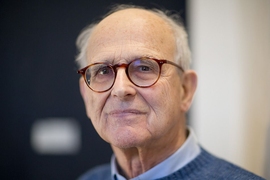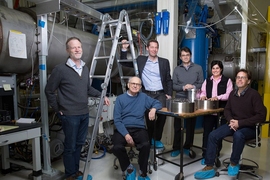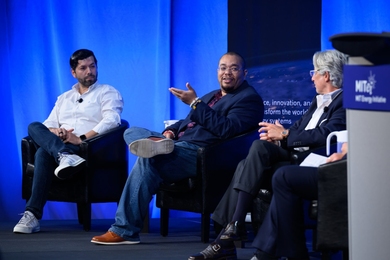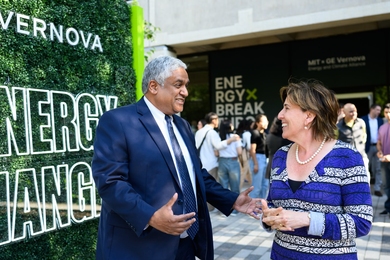Rainer Weiss, emeritus professor of physics, has been awarded the 2016 Shaw Prize in Astronomy. The annual prize is awarded in three categories — astronomy, life science and medicine, and mathematical sciences — to individuals who have made outstanding contributions in academic and scientific research or applications.
Weiss will share the $1.2 million prize with Kip Thorne, Caltech’s Richard P. Feynman Professor of Theoretical Physics, emeritus; and Ronald Drever, emeritus professor of physics at Caltech. Together, they are cited by the Shaw Foundation “for conceiving and designing the Laser Interferometer Gravitational-Wave Observatory (LIGO), whose recent direct detection of gravitational waves opens a new window in astronomy, with the first remarkable discovery being the merger of a pair of stellar mass black holes.”
LIGO’s detection of gravitational waves, announced in February, provided additional confirmation of Albert Einstein’s theory of general relativity and the strongest evidence yet for the existence of black holes and collisions between them. It also offered a striking demonstration of LIGO’s capabilities as a new means of observing the universe.
LIGO, a multi-institutional collaboration led by MIT and Caltech, consists of two interferometers, one at Hanford, Washington, and the other at Livingston, Louisiana, each deploying 4 km-long lasers calibrated to detect the miniscule vibrations produced by gravitational waves — equivalent to 1/200th of a proton in size.
Weiss played an instrumental role in LIGO, first conceiving of the idea to apply laser interferometry to the detection of gravitational waves in 1967 while teaching a class on general relativity. In the 1970s, he led prototype development at MIT and began the decades-long process of designing, developing, and building LIGO with his colleagues at Caltech. The first version of LIGO was completed in 2001, and it ran until 2010 without making any detections. The redesigned Advanced LIGO went online in 2015, making its first detection that September.
“Rai is a remarkable scientist,” said Jacquiline Hewitt, director of the MIT Kavli Institute for Astrophysics and Space Research and professor of physics. “He recognized long ago that general relativity pointed toward new physics and could give us a new way to study the incredible diversity of astrophysical phenomena that the universe presents. Then he went on to devise a way to measure gravitational waves that maybe was impossible or maybe wasn't. Making it actually happen took guts and perseverance. I think we are all thrilled that he was successful in the end.”
Weiss received his BS in 1955 and his PhD in 1962, both from MIT. After appointments at Tufts University and Princeton University, Weiss returned to MIT as a faculty member in 1964. He has also served as an adjunct professor of physics at Louisiana State University since 2011. In addition to his contributions to the detection of gravitational waves, Weiss was also the co-founder and science advisor of the NASA Cosmic Background Explorer (COBE) satellite mission, which measured the spectrum of cosmic microwave background radiation supporting the Big Bang scenario.
Weiss has received numerous awards and honors, including the 2003 Medaille de l’ADION, the 2006 Gruber Prize in Cosmology, and the 2007 Einstein Prize of the American Physical Society. He is a fellow of the American Association for the Advancement of Science, the American Academy of Arts and Sciences, and the American Physical Society, as well as a member of the National Academy of Sciences. Most recently, Weiss received a Special Breakthrough Prize in Fundamental Physics and the 2016 Gruber Prize in Cosmology, both shared with Drever and Thorne.










